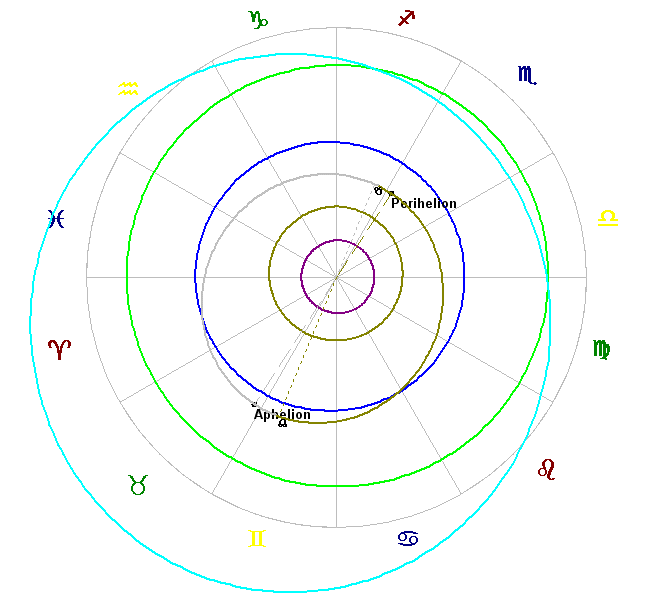
Die Bahn des Kentauren 2000 SN331
The orbit of the Centaur 2000 SN331

View 2000 SN331's orbit with the new 3D-Orbit-Viewer! (Java-applet)
Die Bahnen von Innen nach Außen: Jupiter (lila), Saturn (goldgelb), Uranus (blau), Neptun (hellgrün) und Pluto (hellcyan). Aphelion = Aphel = Sonnenfernster Punkt der Bahn. Perihelion = Perihel = Sonnennächster Punkt der Bahn. Die Knotenlinie markiert die Schnittebene zwischen der 2000 SN331- und der Erdbahn. Wenn 2000 SN331 an einem der beiden Knotenpunkte (aufsteigend = Bewegungsrichtung von Süden nach Norden; absteigend = Bewegungsrichtung von Norden nach Süden) steht, so befindet er sich mit 0° heliozentrischer Breite exakt in der Ekliptikebene.
![]() The orbits from inside to outside: Jupiter
(lila), Saturn (dark yellow), Uranus (blue), Neptune (light green)
and Pluto (cyan). Aphelion = farthest
point from sun. Perihelion = nearest point to sun. The nodal axis
marks the intersection between the orbital planes of Earth and
2000 SN331. When 2000 SN331 (blue-green ellipse) crosses one of both
nodes (ascending = 2000 SN331 moves from south to north,
descending = 2000 SN331 moves from north to south), then its
heliocentric ecliptical latitude is 0°.
The orbits from inside to outside: Jupiter
(lila), Saturn (dark yellow), Uranus (blue), Neptune (light green)
and Pluto (cyan). Aphelion = farthest
point from sun. Perihelion = nearest point to sun. The nodal axis
marks the intersection between the orbital planes of Earth and
2000 SN331. When 2000 SN331 (blue-green ellipse) crosses one of both
nodes (ascending = 2000 SN331 moves from south to north,
descending = 2000 SN331 moves from north to south), then its
heliocentric ecliptical latitude is 0°.
2000 SN331 (olive green ellipse) crosses only the orbit of Uranus. The light grey part of the ellipse is located below the ecliptic plane.
Einige Daten zu den Eigenschaften von 2000 SN331:
Some datas for 2000 SN331:
Entdeckt am/discovered on 23.9.2000
Periode/Orbital Period P = 76,24 Jahre/years
Große Halbachse/ semimajor axis a = 17,97 AE/AU
Exzentrizität/eccentricity e = 0,20
Inklination/ inclination i = 14°43'
Durchmesser/ diameter = unbekannt/unknown
Eigenrotation/Rotational Period = unbekannt/unknown